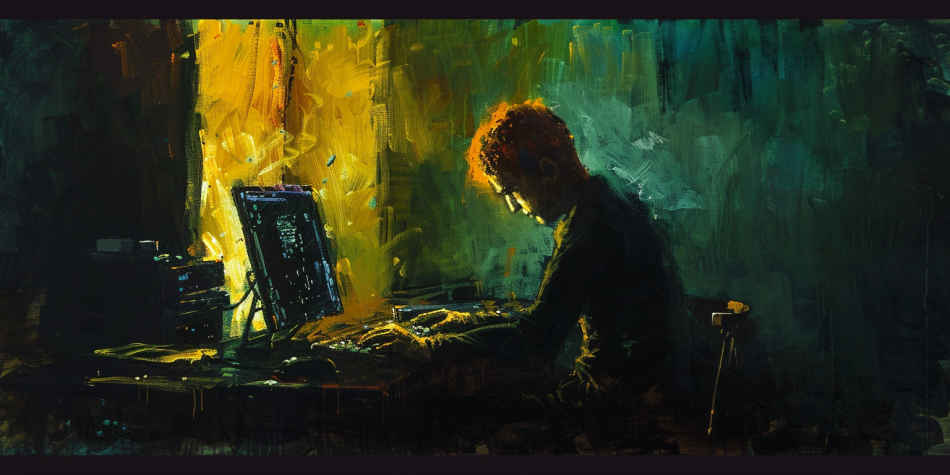Photo by Sophia Sideri on Unsplash
Common words and phrases can sometimes cover up realities rather than reveal them—as was recently argued in an essay on the horrors of abortion being covered up by that sterile medical term. So, what comes to mind when you hear the phrase “using pornography”? On one hand, the language can seem so commonplace that it sounds a little mundane—like any other tool we might turn to in order to cope with life, “I used some Nyquil to get to sleep. … I used an extra Xanax to take the edge off this morning.”
On the other hand, the same phrase can evoke something dramatically evil—taken either as synonymous with having an affair or something even more demonic.
Without denying the unquestionable evil involved in the production, dissemination, and embrace of pornography across the world—and its insidious impact on individual lives and relationships—we wonder if both of these competing reactions (the casual and the dramatic) are missing something important … especially when it comes to what’s actually happening when someone uses pornography. The philosopher Rousseau first asserted that “a single human being” could be “experienced as embodying the greatest good and be worthy of the sort of love that was formerly reserved for God.”
A universal yearning for salvation. The word “salvation” brings to mind, for many, a desire for freedom from “sin” that at first seems limited to religious believers alone. Yet the dictionary defines salvation as “a means of being saved from harm, ruin, or loss” or “preservation from destruction or failure … deliverance from danger or difficulty.”
That’s clearly not unique to believers. In this broader sense, everyone—regardless of philosophy or faith—yearns for freedom from suffering, danger, and pain. If so, how would any human being go about finding that?
In a hundred different ways, of course: Medical treatments and wellness services, alcohol and smoking, eating and illegal drugs, shopping and gambling, gaming and digital streaming options. It’s not hard to see how overrun American culture is with promises of this or that product, program, or service that will “take away your pain” and “free you” (aka save you) from a wide assortment of emotional and physical discomforts.
Porn is one of those making such a promise—and something more and more people the world over are trusting to deliver them from their troubles.
But, of course, it’s not just an escape from pain we’re looking for.
A longing for transcendence. According to one dictionary, “Transcendence is the act of rising above something to a superior state. Those who experience transcendence have gone beyond and surpassed the limitations of “ordinary” or “usual” experience—reaching another realm where their own personal boundaries expand. Although the word can be applied to a variety of experiences—from rock concerts to drug hallucinations—the term is once again most often used to describe a spiritual or religious state. Someone fasts or prays or worships or goes on a retreat … and then comes back and says, “wow, I’ve never experienced anything like that!”
That’s also what many experience when they are first exposed to sexually explicit material. It was psychologist William James who first introduced the value and significance of transcendence to mainstream scholarship in his classic book The Varieties of Religious Experiences. “Self-transcendence” overlaps with other widely-studied psychological constructs such as peak experiences, mystical-type experiences, and certain positive emotions, including love and awe. If the prospect of salvation invites our deepest trust, the pursuit of transcendence invites our highest love and adoration.
And it’s both of these—true deliverance from pain and the entrance into a more transcendent state—that everyone naturally seeks … whether religious or not. So, how are we to find it?
Salvation by stimulation. More and more, sociologists have begun recognizing this wider variety of ways in which human beings seek salvation and transcendence from the mundane struggles of life. Since religion has long been considered the primary vehicle of both, most of these observations consider some kind of activity as a quasi-religious observance.
For instance:
- Anthropology professor Ellen Badone highlights sports as a “form of religion”— especially in “high-profile events” like the Super Bowl and Olympics that “fulfill many of the same needs that religion does”—including helping people “see their lives as meaningful” and “overcome isolation and connect with others” as the common fervor among fans “unite[s] all those who share them into a single social community.”
- It’s also common to hear people describe their first experience with alcohol, ecstasy, and other psychedelics as unlike anything they’ve experienced before. There is a growing genre of authors who proudly announce their rejection of religion in favor of whatever transcendence they can find in trance-like drug-induced states. As one such person wrote, “both provide a path toward transcendence, a way of accessing an extra-human world of rapture.”
- Columnist Helaine Olen writes that for many in recent decades, “Our professional lives had taken on the overtones of a secular religion; they were a primary way to find meaning in the world and a crucial part of our identity.”
- The single-minded quest for beauty has also been explored as a religious phenomenon—with the Western diet industry employing words such as ‘temptation,’ ‘heaven,’ and ‘purity’ in advertisements, alongside their various “sacred texts” detailing extensive rules about what to eat or not eat. This accompanies a broader “cult of physical improvement” promoting certain beauty regiments in a “ritualistic religious-style framework”—including confessionals in popular weight loss groups.
Many other things have been described in rapturous terms—from rock concerts and political rallies to incredible culinary delights and exotic vacations. But even more than sports, substances, and thrills, romance itself has come to occupy an especially transcendent place in American society. It was a couple of hundred years after the courtly love of France that the philosopher Rousseau first asserted that “a single human being” could be “experienced as embodying the greatest good and be worthy of the sort of love that was formerly reserved for God.” The idea began to spread across Europe, with a deeply held cultural ideal emerging over time: namely, that in romantic intimacy could be found answers to some of our deepest, most profound needs. For many, the intensity and sexual arousal associated with falling in love came to be anticipated as the central transcendent experience of life, an “all-powerful solution to the problem of finding meaning, security, and happiness in life.” This was the kind of uplift and self-fulfillment, historian Stephanie Coontz argues, “that the previous generation had sought in religious revivals.” This was “what we had always longed for,” therapist Robert Johnson adds—namely, “a vision of ultimate meaning and unity—suddenly revealed to us in the form of another human being.”

It makes sense that in a secularizing world where spiritual experiences are less and less common, people naturally turn to something else to fill the void and bring a kind of transcendence. And don’t get us wrong … with some exceptions, many of these can be healthy parts of life when used in sensible, balanced ways. Every one of them, however, without exception, can also become a kind of domineering influence that controls our lives and potentially multiplies suffering. In this way, we might fill entire days with Netflix, video games, or food binging. In our modern world, the available distractions are never-ending. Over months and years, individuals can be reduced to nursing their pain—or pursuing yet more escape—through the daily injection of some kind of numbing/stimulating agent. Sexual arousal associated with falling in love came to be anticipated as the central transcendent experience of life, an “all-powerful solution to the problem of finding meaning, security, and happiness in life.”
It’s hard to blame people when this is all they are familiar with. Who has taught them otherwise? What opportunities have they had to learn any other, better way to find salvation and transcendence?
In a world that goads all of us towards this particular path to “liberation,” it makes sense why so many hearts and minds are tilted in that direction. This is hardly a new provocation either. In ancient times, pagan religion competed with the Christian faith by inviting people to come to groves. In these groves and in “passion plays,” many rituals would culminate in lovemaking with the pagan high priest. One scholar suggested that “grove” was understood to be a “euphemistic translation of the places where the grossest forms of sexual excesses and aberrations were practiced in honor of Baal Peor (the Master of the Hole or Vulva) and Ashera, the female principle in nature.”
As one religious author notes, Ashera is portrayed in surviving figurines “as a nude female, sometimes pregnant, with exaggerated breasts that she holds out, apparently as symbols of the fertility she promises her followers.” In paganism, images of greatly exaggerated sexual organs and other body parts were also treated as a kind of sacred object—with one scholar describing cultures where “both male and female figures with disproportionate genital organs are used for purposes of worship.”
Sexuality pervaded Canaanite religious ceremony, in particular, and came after Baal worship in a bout of promiscuous merry-making. As one Christian writer acknowledges, “Much of our knowledge of the origins and character of these fertility cults remains tentative and widely debated. What we do know reveals dark, seductive practices that continued to entice the people God had chosen to be his witnesses.” Clearly, the arousing “lift” from these experiences was enough to become a real draw—leading many away from the true God, to literally worship at the altar of sex.
But of course, this strange religion no longer exists in our day, right?
While literally no one in our educated secular world talks about pornography this way, consider for a second: The rapture. The ritual. The reverence. The imagery. The investment of time, money, and heart. The singular focus and fixed attention.
And the rush of a sexual high anytime you want! No groves or physical gathering necessary. In proxy, people can experience the rapture of intimacy as if witnessing in person … and almost as if doing it themselves. Can you hear the call to worship?
Wanting to feel really, really good? Finding yourself worried, anxious, or sad?
Just find a screen. We’ll make you forget about all that.
Deliverance on demand—an easy liberation available now. Just a click away.
Escape. Elation. Ecstasy!
Throw off the shackles of all the should’s and ought’s. Live free! Do what you want! Feel what you want—anything you want. Enjoy your sexuality without constraint.
In this way, people are being gathered to these Virtual Groves as a kind of quasi salvation—a chance to throw off former restrictions and reach for more pleasure than you’ve been allowed. (Not incidentally, one of Satanism’s core texts identifies the following as a first principle: “Do what thou wilt shall be the whole of the law.”)
None of this, of course, is something people are consciously choosing … but that’s the point of this paper. What could it mean for any of us, perhaps especially believers, to be able to see more clearly these dynamics and recognize this church for what it is?
Salvation in the body of another. Coming full circle, if salvation, indeed, is something we’re all seeking, then the fundamental question becomes simply: Where can we turn? Where will we turn? Where will you seek out your own salvation? And where is the lasting and authentic salvation to be found?
As you can see, there are lots of options available—reflected in the many bodies on display around us. Some believers seem shocked that someone could actually make the choice to trust and love another attractive human body like this, but should it really be all that surprising?
But there is another choice. And another body that can save us from all of this and give us a sweetness far greater than anything porn can offer.
Knowing all the awfulness we’d have to face in this world, Jesus shared broken bread with the people who loved Him and told them, “Take, eat: this is my body, which is broken for you: this do in remembrance of me.”
Earlier, he had taught his followers: “I am the living bread which came down from heaven: if any man eat of this bread, he shall live forever: and the bread that I will give is my flesh, which I will give for the life of the world.”
The people who heard this were incredulous, just as many are today—“how is this even possible?” The Lord responded, “Verily, verily, I say unto you, Except ye eat the flesh of the Son of man…ye have no life in you.”
Rather than simply emphasizing His love for us or His higher teachings to help us make sense of what we face, it’s striking how body-centered Jesus’ offering is: here is my body to save you. It’s not just His one-day love in the heavens He’s trying to persuade people about—it’s the fact that He’s here … right now. In the flesh. Ancient American prophet Alma confirms that “the Son of God suffereth according to the flesh” and took upon him our “infirmities” so that “his bowels may be filled with mercy, according to the flesh, that he may know according to the flesh how to succor his people according to their infirmities” (emphasis our own).
Although the Lord is emphasizing here the tangibility of what he’s offering, these possibilities still often feel abstract, even invisible, especially compared to the many other bodies right in our faces—accompanied by the relentless message, No, you want a body to save you? Check this out!
In addition to bringing an immediate reward, notice how remarkably little effort is involved in this alternative “salvation”—indeed, almost none at all. By contrast, the path of salvation Jesus invites people along involves hope in something we can’t yet (fully) see, sacrifice, hard work, and even some short-term discomfort (sometimes the very thing we are seeking rescue from).
As such, this is something that can feel wholly unfamiliar and foreign to those accustomed to this on-demand relief. In this mindset, the “click” right there in front of me seems the much more logical and reasonable choice. “And if I’m wrong, I’ll worry about it later. I need salvation now anyway, not later down the road.”
But make no mistake: HE is better than all this—and everything being offered around us.
Yet compared with the many other paths of pseudo-salvation described above, Christian salvation always involves some degree of turning towards what is hard and what is painful, rather than just pushing away from it. In the bending of the knee, the opening of a communion with God, the confession of a sin, or the partaking of the sacrament, the mind and heart are inevitably turned more directly towards an honest reckoning with one’s circumstances and conditions first of all.
Everything you’re yearning for in life—all that is sweet, truly joyful, and amazing that you want to experience, He really can give you.
If you’re currently in the habit of turning somewhere else, recognize this as an opportunity to move the habits of your heart and mind in another direction.
Towards Him—the one who can rescue you from everything that you’re grappling over and anguishing about … For good. With no nasty after-effects.
Everything that you’re confused about and stuck over … well, He’s not confused. And He’s not stuck!
And everything you’re yearning for in life—all that is sweet, truly joyful, and amazing that you want to experience, He really can give you.
His covenant path is better than porn. The offering of His spirit is a sweeter companion than pornographic partners. And the many other real-life, life-long relationships you will find in His service are far richer and more rewarding than pixelated “belonging” and “connection” will ever give you.
Moment by moment, then, this becomes our choice: Do we run after some kind of stimulation— anything to not feel this? Or do we take whatever we are feeling to Him—the One who has the authority and power (and empathy) to show us the unique lessons this moment offers and to lead us to a moment where He will “wipe away our tears” in an ultimate redemption unmatched by anything else?
This is a deliverance from the dark abyss that can’t be found, and will never be found, in the pursuit of another human body. Of this, you can be certain: there has never been, nor ever will be, a longitudinal study suggesting truly long-term and transcendent benefits derived from ongoing pornography use.
None of this, to reiterate, may be apparent to most people. So, let’s talk about it! The point here is to raise awareness of a “porn use” substructure we’re not paying attention to enough—bringing greater attention to where our heart’s love and our mind’s love are ultimately going.
Of course, seeing this is certainly no guarantee we’ll have the motivation and strength to do anything about it—and we’re not at all suggesting this realization can somehow simply free people from the grasp of this complex problem, given its many potential past and present influences. But maybe this kind of fresh awareness can help in some way and unleash new reservoirs of motivation—especially as someone’s recovery comes to center more on the legit Savior of the world.
Whatever transcendence and pleasure you might feel you’ve found in other pathways of salvation—and whatever you might fear missing out on—remember Paul’s ultimate reassurance that “as it is written, Eye hath not seen, nor ear heard, neither have entered into the heart of man, the things which God hath prepared for them that love him.”
You don’t have to believe us. Go learn from your own experience. Experiment on these words, and you’ll learn for yourself the goodness of the journey ahead. Your pathway of healing and recovery may still be long, but at least remember this, the ultimate choice before all of us: will you seek salvation in His body—or the body of another human being around you?
That’s up to you.
Notes:
To go a little deeper, check out Jacob’s audio recording, “Whose Body Will Save You?” a meditation on pornography addiction, along with “Not You. Not What You Want. Not Who You Want to Become.” If you’re looking for small group support to find greater strength to step towards freedom from compulsive sexuality, check out Safe House groups here. And if you’d like some self-guided education, tracking, and community support, check out the award-winning Fortify app, used by 200K people in 155 countries

















